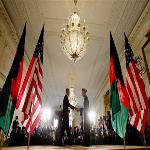14 May 2010

Photo: AP
President Barack Obama, left, and Afghanistan's President Hamid Karzai, right, shake hands following their joint news conference in the East Room of the White House in Washington, 12 May 2010
When President Obama last year announced the commitment of an additional 30,000 troops to Afghanistan, he also set July 2011 as the date to begin withdrawing troops if security conditions permit. Congressional Research Service analyst Ken Katzman says President Karzai came to Washington seeking some kind of commitment that the U.S. will not forsake Afghanistan when that date arrives.
"What the Afghans are really looking for out of this visit is a long-term commitment, a sign that the July 2011 deadline to begin a transition or begin a withdrawal or downshifting is not any real major reduction in the U.S. commitment," he said. "Karzai really came looking for a sign that the U.S. is not abandoning Afghanistan in July 2011," said Katzman.
It appears that he got that commitment. From President Obama on down, U.S. officials hastened to reassure the Afghan leader that the U.S. is in for the long term. In a joint public appearance with President Karzai, Secretary of State Hillary Clinton reiterated that the new strategic partnership between the two countries will extend beyond the battlefield.
"The enduring partnership will last long beyond any security transition, any withdrawal of combat forces over time," Clinton said. "We are committed to a strategic partnership with Afghanistan."
The diplomatic reconciliation came after several months of sometimes bitter words, even in public, from the U.S. side about President Karzai's alleged lack of commitment to clean up corruption and the Afghan leader's stinging response decrying what he said was Western pressure.
In their appearances, both the U.S. and Afghan presidents made of point of saying their differences are a normal part of relationships between friendly governments.
But another kind of reconciliation remains a sticking point between Washington and Kabul. U.S. and Afghan officials have somewhat different approaches on how to deal with the Taliban in a future Afghanistan.
The Kabul government favors reintegration of some Taliban back into society. As President Karzai pointed out, that would extend to low-level Taliban fighters who are not particularly ideological.
"Now, these thousands of the Taliban that you are trying to address and reintegrate are ideologically not against us," said Karzai. "They're countryside boys who don't hate the United States, perhaps a lot of them would like to visit the United States given the opportunity, who don't hate their own government or their own country, who would not have a problem with our constitution."
The U.S. has no quibble with that, but the Karzai government also favors trying to reach some kind of reconciliation with the upper echelons of the Taliban leadership. RAND Corporation analyst Jason Campbell says the U.S. has balked at the idea that people it deems terrorists would be welcomed back into the political fold.
"President Karzai has now planned for a 'peace jirga' at the end of May, and he would like it to have at least the possibility of some middle and upper Taliban leaders, whereas the administration right now, while they have shown a little bit of flexibility, would still prefer to be in a better position from the standpoint of sort of security. They would like to have better momentum going into such talks," said Campbell.
Secretary Clinton says the reconciliation issue is still an open issue.
"I don't think any of us can predict what the outcome of the next phase will be," said Clinton. "First, the president has to have his own consultative peace jirga and listen to his own people, because they may have very strong opinions. There may be people that they're willing to see the president discuss potential reconciliation, and then there may be people that they're not."
Some ranking Taliban have been invited to the peace jirga', or grand council, but it is not clear if they will attend. It is likely to take place even as the U.S. offensive in Kandahar is going on. The top U.S. and NATO commander in Afghanistan, General Stanley McChrystal, says it will probably take until the end of the year before the Kandahar operation can be judged a success or failure.